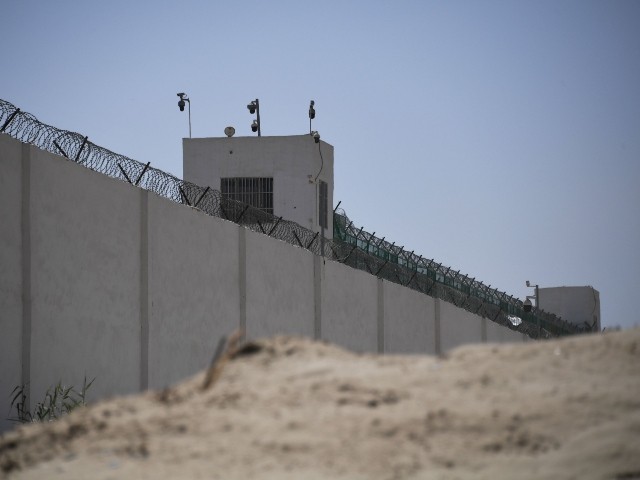China Praises Cuba for Defending Uyghur Genocide at U.N. Human Rights Council
The communist government of Cuba hijacked this week’s ongoing U.N. Human Rights Council session to deliver a statement, signed by 69 countries, in support of China’s genocide of Uyghur and other non-Han ethnic groups in occupied East Turkistan.
Cuba and China, in addition to several other dictatorships and human rights abusers, enjoy seats on the Council, regularly using them to undermine the mission of the Council by forcing it to focus on Israel or America. Under President Donald Trump, America vacated the Council in protest of the disproportionate representation that human rights abuses have on the U.N. body, but President Joe Biden reversed that decision, making America a participant in the Council’s activities.
The Council recently expelled Russia in response to the eight-year-old invasion of Ukraine, which is also on the Council, but has made no similar moves against Cuba, China, Venezuela, Qatar, and other serial human rights violators.
Cuba’s intervention to defend genocide at the Human Rights Council was a response to 47 countries, including the United States, issuing a statement on Tuesday directed at U.N. High Commissioner for Human Rights Michelle Bachelet, who recently visited East Turkistan and concluded that the extensively documented Chinese concentration camp system had been dismantled and praised China’s atrocious human rights record.
Bachelet’s visit prompted global condemnation, particularly her effusive praise for China’s “tremendous progress” in human rights, and calls for her resignation. Last week, Bachelet said she would not seek reelection to the post when her first term expires in August.
“We urge China to ensure full respect for the rule of law, to comply with obligations under national and international law with regard to the protection of human rights and to ratify the ICCPR [International Covenant on Civil and Political Rights],” the statement read. “In addition, we urge the Chinese government to provide meaningful and unfettered access for independent observers to Xinjiang [East Turkistan] , including Special Procedures. In view of the severity of the situation in Xinjiang, we call on all countries to respect the principle of non-refoulement.”

This photo shows the outer wall of a complex, which includes what is believed to be a re-education camp where mostly Muslim ethnic minorities are detained, on the outskirts of Hotan, in China’s northwestern Xinjiang region, on May 31, 2019. (GREG BAKER/AFP via Getty Images)
The statement omitted the word “genocide” despite multiple signatory states having officially found China guilty of genocide in East Turkistan. It also demanded more information on human rights abuses in Tibet and Hong Kong.
The Chinese government began a genocide campaign in East Turkistan against the majority Uyghur population of that region, trapping as many as 3 million people into concentration camps, forcibly sterilizing entire villages of women, and using gruesome torture practices such as rape with electric batons to subdue the population. Evidence also suggests that China is harvesting live organs from political prisoners to sell on the black market.
China dismissed the statement as primarily signed by “developed” European countries, but among the signatories were African states Eswatini and Liberia, as well as Pacific island states Palau and Marshall Islands and Latin America’s Guatemala and Honduras.
Cuba’s statement defending China from genocide concerns, in contrast, was signed by some of the world’s most notorious abusers of their own people: North Korea, Iran, Saudi Arabia, Zimbabwe, Venezuela, Russia, Belarus, and Turkmenistan, among others. Also appearing on the list are Nayib Bukele’s El Salvador, Chinese military base host Djibouti, and Myanmar, itself facing years of evidence that it is committing genocide against its ethnic Rohingya Muslim population.
A nombre de 69 países, #Cuba 🇺 defendió en el #HRC50 la soberanía e integridad territorial de #China 🇳, ante los intentos de injerencia occidental en sus asuntos internos y la politización de los derechos humanos. @JAQuintanillaR @CubaMINREX @AnayansiRCamejo @RodoBenitezV pic.twitter.com/An7FeLuQT6
— Misión Cuba Ginebra (@MisionCubaONUG) June 14, 2022
“Respect for sovereignty, independence and territorial integrity of states and non-interference in internal affairs of sovereign states represent basic norms governing international relations. Hong Kong, Xinjiang and Tibet related issues are China’s internal affairs that brook no interference by any external forces,” the statement read in part. “We oppose politicization of human rights and double standards.”
“We also oppose unfounded allegations against China out of political motivation and based on disinformation, and interference in China’s internal affairs under the pretext of human rights,” the statement read, referring to the heavily documented genocide.
China’s Foreign Ministry applauded Cuba and its allies for defending its genocide of the Uyghur people on Wednesday.
“Once again, nearly a hundred countries at the Human Rights Council spoke up for justice. And once again, the attempt of a handful of Western countries to attack and smear China on Xinjiang, Hong Kong and Tibet has been thwarted,” Foreign Ministry spokesman Wang Wenbin declared in his regular briefing on Wednesday. “This fully shows that political manipulation through human rights issues and interference in other countries’ internal affairs will find no support and will never succeed.”
Wang went on to claim that “those few Western countries” that signed the initial statement (including, presumably, Palau and Liberia) “ignore and trample upon human rights.”
“They are the No.1 origin of human rights tragedies in the world,” Wang claimed.
The Chinese state newspaper Global Times similarly celebrated Cuba and the other dictatorships supporting it in a column featured on its home page on Friday, declaring, “no country wants to be subject to US hegemony when it explores its own path of human rights.” The initial anti-genocide statements was submitted by the Netherlands.





Comments are closed.